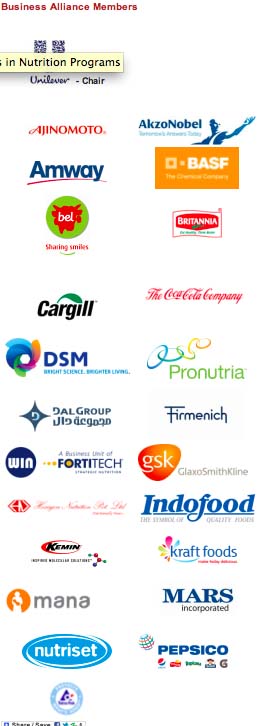STOP PRESS – After UPDATE went to Press GAIN told us that Danone is no longer a member because it is a Code violator.
The Global Alliance for Improved Nutrition is an especially worriesome entity.
On the Lead Group of SUN (the Scaling Up Nutrition Initiative – see page 24) it is in a key position to influence SUN policy development. GAIN often presents a benign image as a non-profit NGO that is only interested in reducing malnutrition through local foods and small companies. However, those of us who are involved in advocating stricter marketing controls see a different side.
For example:
• Lobbying at Codex
For the last 3 years we have witnessed GAIN’s lobby against World Health Assembly Resolutions atCodex Alimentarius meetings where global food standards are set.

GAIN is clearly trying to open up markets for fortified foods and supplements for its Business Alliance members such as Danone (see note above), Pepsico, Coca Cola, Brittania. Some of the members are pictured left. (See page 26.)
• Lobbying Kenya
In October, GAIN challenged the Kenya’s draft law that proposed strict controls on baby formulas and foods. In its lobby paper GAIN implied that proceeding with the law would threaten “Kenya’s ability to meet its commitments as a Scaling Up Nutrition (SUN) country.” We have asked how SUN can claim to be government-led when a member of its Lead Group is doing such lobbying. Kenya went ahead with the Law. (See page 15.)
• World Health Assembly
GAIN has been involved in WHO’s work on micronutrients and in 2012 applied for official NGO relations status. This would allow it to make interventions at Assembly meetings. The WHO Executive Board in January 2013 did not approve the application, pending answers to questions about GAIN’s relations with global corporations and allegations about its lobbying against WHA Resolutions on baby foods.
(See Executive Board Resolution 132.R9. January 2013)
• Monitoring
The first report of the GAIN sponsored Access to Nutrition Index (ATNI) was published in March 2013. The report scored 25 of the world’s largest food and beverage manufacturers on the basis of their written policies and statements, rather than on independent monitoring of their actions on the ground.
The highest scores went to the companies that have invested most in using Public Relations strategies to counter criticisms. Danone, Unilever, Nestle, PepsiCo and Kraft reaped the reward as media reports described them as the “best large firms worldwide when it comes to offering products that address both the problems of obesity and poor nutrition…” (USA Today).
ATNI criteria are the perfect whitewash because they reward companies for all the wrong things: the promotion of fortified foods, consumer ‘education’ about healthy diets and active lifestyle, and engagement with ‘stakeholders’ in public private partnerships.
• Lack of transparency
The British Medical Journal wrote to Veena Rao about her opinion piece entitled, “Law on infant foods inhibits the marketing of complementary foods for infants, furthering undernutrition in India”
In this online Personal View ..Veena Rao, did not declare any competing interests. She has now told us that she has been “a member of the Advisory Board on the Britannia Nutrition Foundation (a non-profit trust) since 2009.”
Brittania Industries is represented on the Lead Group of SUN and the Board of GAIN. Its stated purpose is to “Help people enjoy life –through healthy snacking.” Encouraging all day snacking on ‘slightly better for you’ junk foods seems to be one of the food industry’s Top Strategic Priorities.
